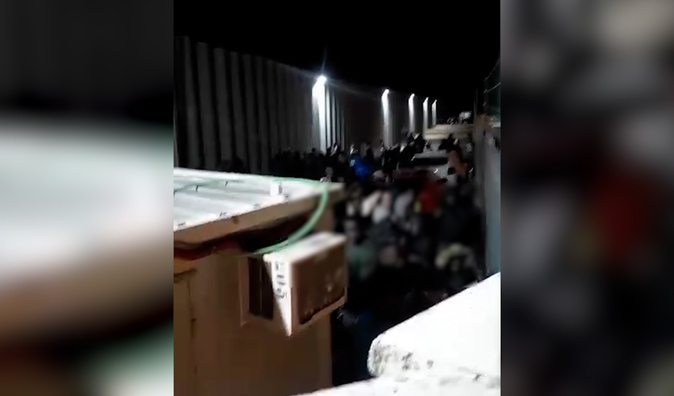DANIEL J. OLLERO Madrid
Madrid
Updated Thursday, February 1, 2024-00:03
Human Rights The immigrants from the Alcalá de Henares barracks denounce that they have been poorly fed for two months, with the same clothes and without doctors: "We are worse than in prison"
8:30 p.m. at the old Army barracks at the José Cadalso base in Alcalá de Henares. Hundreds of African immigrants protest and shout in small groups. «We are here at Accem [they call the center by the name of the organization to which the workers assigned there belong].
They treat us very badly; like dogs "Everyone is here and people are demanding their rights
," a young sub-Saharan man tells the camera in French, sending a video of the protest to GRAN MADRID accompanied by desperate messages
requesting help and legal assistance
.
A crowd of men from different countries in the Maghreb, the Sahel and Sub-Saharan Africa
have been protesting "every night since the beginning of this week",
coinciding with dinner time to demand improvements in their quality of life and that their rights be respected. humans. "
We need a lawyer, we need a lawyer to come," they repeat over and over again
in their communications with this medium. "It's very urgent, please," they implore. In addition to the uncertainty, their greatest fear is facing reprisals - GRANMADRID witnessed how a worker
tried to prevent immigrants from speaking to the press
in public, stating that it was "prohibited" -, which
in the worst case means being deported
, as happened to 21 of its residents, according to the Spanish Refugee Aid Network.
The protest takes place on a huge esplanade with a concrete floor dotted with weeds, expansion joints and gravel, escorted by immense white tents - where they eat and sleep -, with a single bench located in the middle of this anodyne plain. "
We spend the whole day here... Without activities, without classes, without doctors, without doing anything
," they complain. "We want to learn Spanish, we want to study, we want to go out and have activities," they say.
When talking about their living conditions, these men compare their stay in the Alcalaíno barracks with "a prison" or even "worse than a prison." A simile that is better understood after watching the recordings that GRAN MADRID has been able to access.
Metal fences more than three meters high with powerful spotlights
surround the concrete, gravel and dirt lot, where more than 1,000 men eat, live and sleep, except for the three and a half hours in the afternoon when they can leave. walk around the area.
When crossing the threshold of the sliding door guarded by social workers and employees of a private security company, the contrast is total. The city, in a new neighborhood with wide avenues with
chalets
, schools,
centers attached to the University of Alcalá de Henares
, upper-middle class homes, the Atlético de Madrid sports city and a shopping center, whose surroundings people come to wander, to hang out in the park and search for WiFi.
The routine
back to the center is also reminiscent of a prison
, as shown in the images captured and shared on the sly by the immigrants themselves. In them, you can see an open-air corridor bordered by a large wall on one side, a metal fence on the other and a prefabricated booth as a bottleneck, converted into a checkpoint
,
where the bustle is evident.
Another of the busiest points of the camp is the dining room, where from 8:30 p.m.
Dinner begins to be shared, which consists of a plate of rice, a portion of pre-cooked potato omelette with a side of salad
, accompanied by a crust of bread. Water to drink and yogurt for dessert. A diet described as "horrible" by its diners.
Finally, the guided tour concludes in another of the tents, where dozens of bunk beds are arranged next to the canvas walls and in the center of the room. An open-plan room in which wooden floors have been installed and in which
immigrants have small lockers
to store the few belongings they have.
In this old barracks renamed the Alcalá de Henares Reception, Emergency and Referral Center by the Ministry of Inclusion, Social Security and Migration, monotony has become the tone of the inhabitants and in which any small novelty becomes a news that spreads like wildfire behind these walls: "
Today they called about 30 people to give them their clothes
," they say. "However, there are still many people who have not found clothes to change into," they say. "That's why," they implore, "
we need to be heard
, we need a lawyer, we need to claim our rights."

